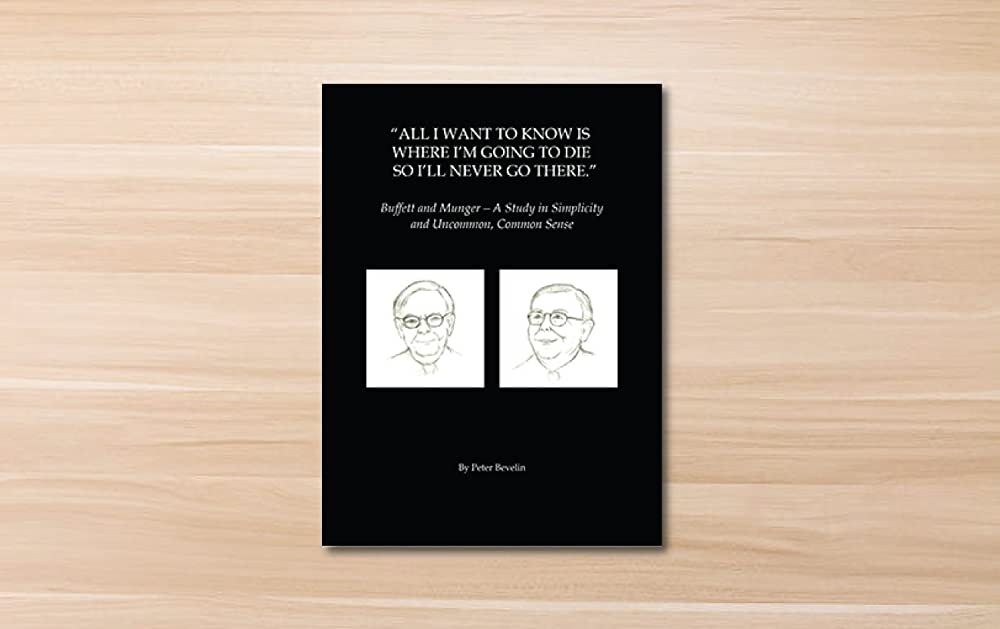All I Want To Know Is Where I’m Going To Die So I’ll Never Go There: Buffett and Munger By Peter Bevelin Summary
"The value of every business, the value of a farm, the value of an apartment, the value of any economic asset is 100% sensitive to interest rates. The higher interest rates are, the less that present value is going to be." — Warren Buffett

Key Takeaways
- "The value of every business, the value of a farm, the value of an apartment, the value of any economic asset is 100% sensitive to interest rates. The higher interest rates are, the less that present value is going to be. Every business, whether it's Coca-Cola or Gillette or Wells Fargo — its intrinsic valuation is 100% sensitive to interest rates." — Warren Buffett (1994)
- “Interest rates are to asset prices what gravity is to the apple. They power everything in the economic universe. When there are low interest rates, there is a very low gravitational pull on asset prices.” — Warren Buffett
- "Interest rates are like gravity in valuations. If interest rates are nothing, values can be almost infinite. If interest rates are extremely high, that's a huge gravitational pull on values."
- "The most important item over time in valuation is obviously interest rates. Low interest rates make any stream of earnings from investments worth more money. Any investment is worth all the cash you're going to get out between now and Judgment Day, discounted back. Well, the discounting back is affected by which interest rates you use."
- "There's nobody whose predictions on interest rates I would pay attention to, even myself, even Charlie." — Warren Buffett (2018)
- Don’t focus on macro forecasting, it’s impossible. Focus on being in business with good people.
- Learning is not memorizing information. Learning in changing your behavior.
- The fundamental algorithm of life: Repeat what works.
- Frugality is a moat. The business that can keep costs the lowest has an edge.
- Spend a lot of time reading and thinking. Few people do this. History and financial history are essential.
- Study history to avoid common problems: drunk driving, STIs, etc. Avoid the mistakes made by people before you.
- Study effective people and figure out what makes them effective. (Inputs and practice?)
- "Smart men go broke in 3 ways: Liquor, ladies, and leverage." - Charlie Munger
- Extreme success warps people’s minds. The successful don’t fail because they mess up. They fail because they go “insane”.
- Your business should have lots of cash. Keep cash in US treasury bills.
- A brand is a promise.
- You do not want bad customers. Cut off customers who are stingy and complain a lot. Your business doesn't need to be open to everyone.
- It is essential to have the right heroes. Choose your heroes carefully. Your heroes can be dead or alive.
- There is no substitute for interest. If you're genuinely interested, you'll put in the work to be successful. If you're not interested, you won't put in the work.
- You do not have to attend every argument that you’re invited to.
- Make a list of everything about your product that irritates customers and then eliminate those defects one by one.
- How to find the best company in an industry: When interviewing managers, ask them if they had a silver bullet and could take out any of their competitors, which company would it be? Or, “If you had to put 100% of your net worth into the stock of a competitor, which would it be?” Then ask, “Which would you short?”
- Most companies get sloppy after they get rich. To avoid this, continually widen your moat and relentlessly cut costs.
- To win, work with winners. Only partner with or employ “A players.”
- How do you beat Bobby Fischer? Play him in any game besides chess. Unusual records are a result of high levels of talent in low-competition environments. To win, find an industry filled with idiots and dominate them.
Notes
The fundamental algorithm of life: Repeat what works.
Spend a lot of time reading and thinking. Few people do this.
Don't be fooled by randomness.
Inversion. Figure out all the causes of failure so you can avoid them. Figure out what you don't like so you can figure out what you like.
If you need a 50-page contract, don't do the deal. Only do deals with people you'd be comfortable doing a 1-page contract with.
Study history to avoid common problems: drunk driving, STIs, etc. Avoid the mistakes made by people before you.
- A great lesson from Madoff. Only get into risky assets at the bottom. If you buy at the top you'll lose a ton of money.
- Another lesson from Madoff. Only do legal businesses. Madoff had two businesses: one legal and one illegal. He could have only done the legal business but greed made him keep both.
History and financial history are essential.
Study effective people and figure out what makes them effective.
Focus on the essence. The most important thing. If you want a job, that's the resume. The resume is what gets you an interview.
Don't work with B or C players. Only A players.
You can't fix a person or a business to be an A player or an A business. Better to look for A opportunities.
Three kinds of people: Innovators, imitators, and idiots.
Do not read other people's opinions. Just read the facts yourself and come to your own conclusion. At least then you'll be uniquely right or wrong.
"If you want to know whether you are destined to be a success or a failure in life, you can easily find out. The test is simple and it is infallible: Are you able to save money? If not, drop out. You will lose. You may think not, but you will lose as sure as you live. The seed of success is not in you." - James J. Hill
"Smart men go broke in 3 ways: Liquor, ladies, and leverage." - Charlie Munger
Your business should have lots of cash. Keep cash in US treasury bills.
The world is not driven by greed, it's driven by envy. Eliminate envy from your life. You could give someone a $2 million bonus and they'll be happy--until they see that the next guy got a $2.1 million bonus, and then they're miserable.
A brand is a promise.
Buffett and Munger are fans of Sol Price. He is a retail legend. Bezos, Walton, and the other retail giants took ideas from him.
You do not want bad customers. Cut off customers who are stingy and complain a lot. Your business doesn't need to be open to everyone.
It is essential to have the right heroes. Choose your heroes carefully. Your heroes can be dead or alive.
There is no substitute for interest. If you're genuinely interested, you'll put in the work to be successful. If you're not interested, you won't put in the work.
When hiring, figure out: Do they love the business, or do they live the money? Are they passionate about the position?
When you acquire a business, don't really change anything, just let the business run autonomously.
- Avoid leveraging up the business, grant autonomy to the managers, and never sell. This way you attract the people who truly care about the business and aren't just looking for a big exit.
- If a business is looking for a quick exit, it clearly doesn't have much long-term potential, which is why Buffett is ok with not purchasing them.
People need to know why. If you’re telling an employee to do something, write the task down and explain how to do it and why it’s important.
- Other founders would say not to tell the employee how to do it. That way you get a creative solution that could be better.
You do not have to attend every argument that you’re invited to.
Extreme success warps people’s minds. The successful don’t fail because they mess up. They fail because they go “insane”.
"The value of every business, the value of a farm, the value of an apartment, the value of any economic asset is 100% sensitive to interest rates. The higher interest rates are, the less that present value is going to be. Every business, whether it's Coca-Cola or Gillette or Wells Fargo — its intrinsic valuation is 100% sensitive to interest rates." — Warren Buffett (1994)
“Interest rates are to asset prices what gravity is to the apple. They power everything in the economic universe. When there are low interest rates, there is a very low gravitational pull on asset prices.” — Warren Buffett
"Interest rates are like gravity in valuations. If interest rates are nothing, values can be almost infinite. If interest rates are extremely high, that's a huge gravitational pull on values."
"The most important item over time in valuation is obviously interest rates. Low interest rates make any stream of earnings from investments worth more money. Any investment is worth all the cash you're going to get out between now and Judgment Day, discounted back. Well, the discounting back is affected by which interest rates you use."
"There's nobody whose predictions on interest rates I would pay attention to, even myself, even Charlie." — Warren Buffett (2018)
"If interest rates are destined to be at low levels. it makes any stream of earnings from investments worth more money. The bogey is always what government bonds yield. Any investment is worth all the cash you’re going to get out between now and judgment day discounted back."
"The discounting back is affected by whether you choose interests rates like those of Japan or interest rates like those we had in 1982. When we had 15 percent short-term rates in 1982, it was silly to pay 20 times earnings for stocks.”
"I would say that's the most important question in the world. And I don't know the answer." — (Buffett was responding to a question about the impact of negative US interest rates on financial markets) (2020)
“Charlie and I don’t expect to win you over to our way of thinking. We’ve observed enough human behavior to know the futility of that but we do want you to be aware of our personal calculus.”
- Learning is not memorizing information. Learning in changing your behavior.
Buffett and Munger don’t have a master plan. They just look for opportunities among all assets. Except they only invest in things that they have a knowledge advantage in. In other words, don’t invest in things you haven’t thoroughly researched.
Do not be too timid. Go at life with a little courage.
Extreme focus and extreme frugality are the keys to success.
Frugality is a moat. The business that can keep costs the lowest has an edge.
Make a list of everything about your product that irritates customers and then eliminate those defects one by one.
How to find the best company in an industry: When interviewing managers, ask them if they had a silver bullet and could take out any of their competitors, which company would it be? Or, “If you had to put 100% of your net worth into the stock of a competitor, which would it be?” Then ask, “Which would you short?”
Most companies get sloppy after they get rich. To avoid this, continually widen your moat and relentlessly cut costs.
To win, work with winners.
How do you beat Bobby Fischer? Play him in any game besides chess. Unusual records are a result of high levels of talent in low-competition environments. To win, find an industry filled with idiots and dominate them.
If you get 1% better every day, it may take a long time but you’re almost guaranteed success.
Don’t focus on macro forecasting, focus on being in business with good people.



Comments ()